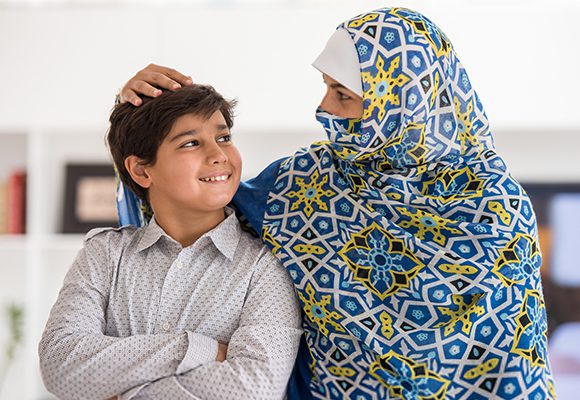Narrated Abu Musa (radiyallahu anhu): “Some people asked the Prophet![]() “Whose Islam is the best? i.e. (who is a very good Muslim?” He replied, “One who avoids harming the Muslims with his tongue and hands. 1
“Whose Islam is the best? i.e. (who is a very good Muslim?” He replied, “One who avoids harming the Muslims with his tongue and hands. 1
As mothers, we are over our children. We are responsible for raising them. And they are obligated to obey us unless we command them to do wrong. But how many times have we heard of the one who is in charge taking advantage of the one he is in charge of?
It is easy to take out our frustrations, bad day or other problems on our children . . . they are helpless, weak and dependent upon us. But during our times of troubles, we must remember that they have a right on us. On the Day of Judgment, no one will be concerned about their mother, father, sister or brother. Everyone will try to save themselves. We don’t want our children to be of those who will take from our good deeds because we mistreated them. When correcting our children for misbehavior, we must be certain we are giving them their rights
Here are a few tips on how to control your Temper when disciplining your children
“O Ye who believe! Fasting is prescribed to you as it was prescribed to those before you, that you may (learn) self-restraint.” (Quran, Al Baqarah, 2: 183)
- FastingFasting is one of the best ways to learn self-control. This self-control overflows into many areas of our daily lives. One of those realms is that of childrearing. Although avoiding eating can sometimes put one on edge, it also has a calming effect. We are often more subdued when our stomach is not full. In addition, when fasting we are encouraged to avoid conflict and argumentation. Most of us are familiar with the hadith that says, if somebody should fight or argue with you, you should say, ‘I am fasting.’.
Another way to learn self-control when disciplining is to read about and learn of the ways the Prophet ![]() dealt with children. We should use him as our example. Here is a truly inspiring story that puts into perspective the manner in which we should discipline our children.
dealt with children. We should use him as our example. Here is a truly inspiring story that puts into perspective the manner in which we should discipline our children.
Anas ibn Malik said, “The Prophet![]() had the best disposition among people. One day he sent me on an errand and I said, ‘By Allah, I will not go,’ but it was in my mind that I would do as the Prophet had ordered me. I went until I saw some children playing in the street. Then the Prophet
had the best disposition among people. One day he sent me on an errand and I said, ‘By Allah, I will not go,’ but it was in my mind that I would do as the Prophet had ordered me. I went until I saw some children playing in the street. Then the Prophet ![]() came and saw me and he caught me by the back of my neck from behind. When I looked at him, he was smiling, and he said, ‘Unays (Anas’ nickname), did you go where I asked you to go?’ I said, ‘O Messenger of Allah, yes, I am going.’”
came and saw me and he caught me by the back of my neck from behind. When I looked at him, he was smiling, and he said, ‘Unays (Anas’ nickname), did you go where I asked you to go?’ I said, ‘O Messenger of Allah, yes, I am going.’”
Take note of where Anas said, “I will not go” when the Prophet![]() asked him to do something? There was no pulling out the belt or searching for a stick to let Anas know who’s the boss around here. Let us aspire to be patient, kind, and tolerant when our children exhibit their shortcomings.
asked him to do something? There was no pulling out the belt or searching for a stick to let Anas know who’s the boss around here. Let us aspire to be patient, kind, and tolerant when our children exhibit their shortcomings.
3. The reward for patience
Also, ponder upon how valuable it is to be patient, not just for your child but for yourself.
Abu Sa’id Al-Khudri (ra) reported that: Certain people of the Ansar asked the Messenger of Allah ![]() and he gave to them; then they again asked him and he gave to them until all what he possessed was exhausted. Then the Prophet
and he gave to them; then they again asked him and he gave to them until all what he possessed was exhausted. Then the Prophet ![]() said, “Whatever wealth I have, I will not withhold from you. Whosoever would be chaste and modest; Allah will keep him chaste and modest and whosoever would seek self-sufficiency, Allah will make him self-sufficient; and whosoever would be patient, Allah will give him patience, and no one is granted a gift better and more comprehensive than patience”. 2
said, “Whatever wealth I have, I will not withhold from you. Whosoever would be chaste and modest; Allah will keep him chaste and modest and whosoever would seek self-sufficiency, Allah will make him self-sufficient; and whosoever would be patient, Allah will give him patience, and no one is granted a gift better and more comprehensive than patience”. 2
Our children come from our bodies, but they are a gift from Allah. One way to show our thankfulness for our beloved gifts is to be kind and forgiving when they make mistakes and don’t live up to our expectations. We pray and hope Allah will do the same for us.

